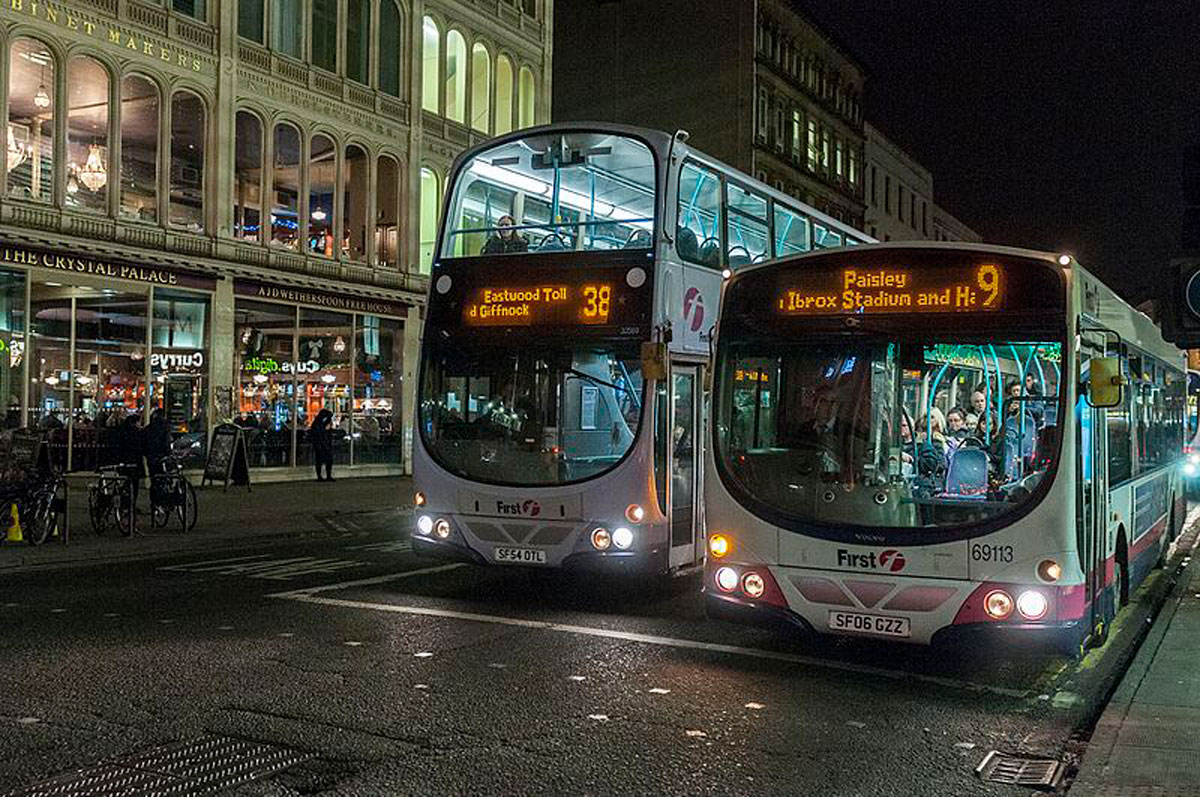
GLASGOW’S night bus service is to be withdrawn at the end of this month.
Citing low passenger uptake and operating losses, First Glasgow has today (10th July) announced that the 11 routes that it has been operating across the city in the early hours of Saturday and Sunday mornings will cease to run as of 31st July.
First Bus said that this decision was made following a 12-month period of monitoring passenger numbers, which found that services were regularly operating with as few as 14 passengers per hour. The company stressed that, despite facing significant losses over this period, it had continued to run its night services through the city ‘in an attempt to support the city’s night-time economy’.
The drivers currently delivering these services will now be redeployed into the daytime network to support services across the city where passenger recovery is strong and additional capacity is required.
A spokesperson for Night Time Industries Association Scotland reacted: “This is devastating news for the Night Time Economy in Glasgow, and for people living in surrounding areas. We are already challenged with limited transport infrastructure after 11pm across the city.
“The removal of the night bus service across Glasgow is short sighted and dangerous, showing no consideration for the safety of thousands of night workers and customers coming home in the early hours of the morning.
“In many cities across the world the local authority drives initiatives to subsidise late night transport services, and to support an industry which at present is suffering heavily under the current trading environment,” said NTIA. “We would ask First Bus and Glasgow City Council to urgently review this position.”
The Scottish Licensed Trade Association described the withdrawal of service as ‘yet another hammer blow’ for the licensed trade.
SLTA managing director, Colin Wilkinson, said: “A city the size of Glasgow should offer a night bus service so that people enjoying an evening out and those working in hospitality can get home safely.
“With the recent introduction of the Low Emission Zone on many vehicles and fewer taxis in the city since the pandemic, some licensed trade businesses are really worried about the impact the removal of night buses will have when they are still trying to claw back business post-pandemic and amid the cost-of-living crisis.
“The SLTA has spoken previously about the chronic lack of late-night transport provision in Glasgow so this is not the news we want to hear as we approach the peak tourist season,” said Mr Wilkinson.
“Our fear is that people will simply not bother travelling into Glasgow city centre if getting home is going to be such a challenge. It’s extremely bad news for the city’s pubs, bars, restaurants and clubs.”
Trade union Unite – which has recently campaigned on the issue of safe travel home for night-time economy workers – said: “Whilst our members driving buses have been told that they will see no job losses, with drivers being re-deployed to other bus services and routes, the situation highlights the deeper issue of a declining service for other workers and the travelling public.
“For example, whilst First Bus concern themselves with profits, the decision impacts on our members in a range of sectors who work shifts and rely on these buses to get to and from work safely. These journeys are vital to ensure a livelihood, but yet again private operators are putting themselves before the public.
“In December, Glasgow Councillors voted to back Unite’s ‘Get me home safely’ campaign, yet continue to ignore the elephant in the room; how do people get home safely?” asked the union. “Without a publicly owned, municipal bus company, their ability to influence the private sector is limited, and this has come to the fore with this decision by First Bus, which will harm working people across the city, particularly those working in the night-time economy.
“Glasgow needs to get control of its public transport system, and make it work for every citizen, not just for shareholders. We repeat our call to explore a fully integrated, not for profit, public transport system which is publicly controlled and accountable.”
First Glasgow reintroduced its night bus services in June 2022, as Covid-19 restrictions were lifted, and has since tried various tactics to get the public onboard, including offering free tickets in December last year, but passenger numbers have remained stubbornly low at between 30% and 35%.
Commercial Director at First Bus Scotland, Graeme Macfarlan, said: “We were delighted to be able to reintroduce our night bus network last June in an attempt to support the city’s night-time economy.
“Despite a wide variety of efforts by First Glasgow and partner organisations to increase the number of people using the night buses, it has not reached the level required to sustain these services beyond July. To do so, we would require the number of people using them each weekend to treble overnight, which is not realistic.
“We really wanted to give these services every chance to succeed which is why we have absorbed the operating losses for the last 12 months,” said Mr Macfarklan. “It has become clear, however, given the change in behaviour and times people are going out in the city at the weekend, there is not enough appetite in Glasgow for night bus services to successfully operate into the early hours.”
The night bus services being scrapped covered travel from the city centre across Glasgow and the surrounding areas, including Clydebank, Paisley, Newton Mearns, East Kilbride, Hamilton, Motherwell and Wishaw.




















